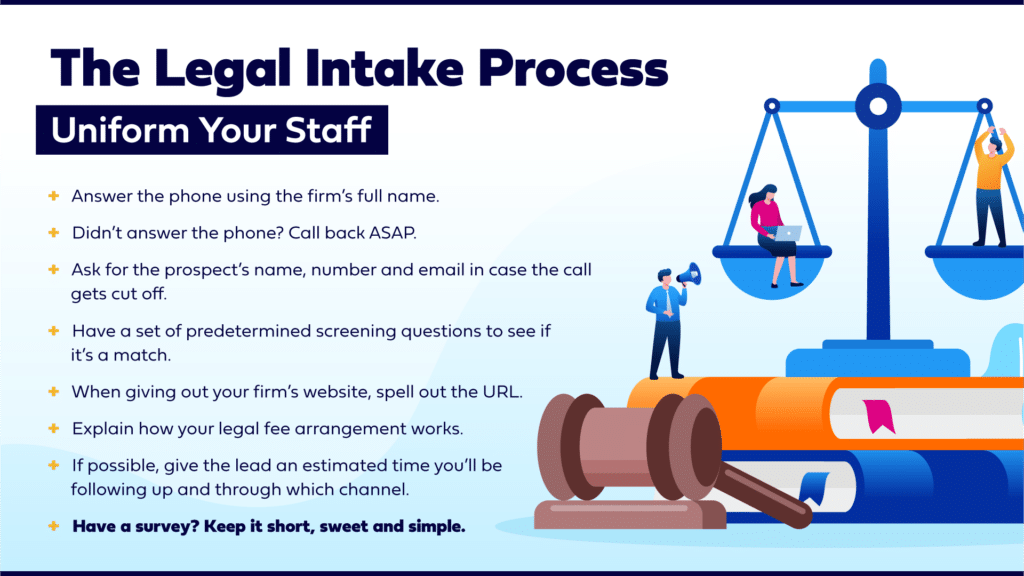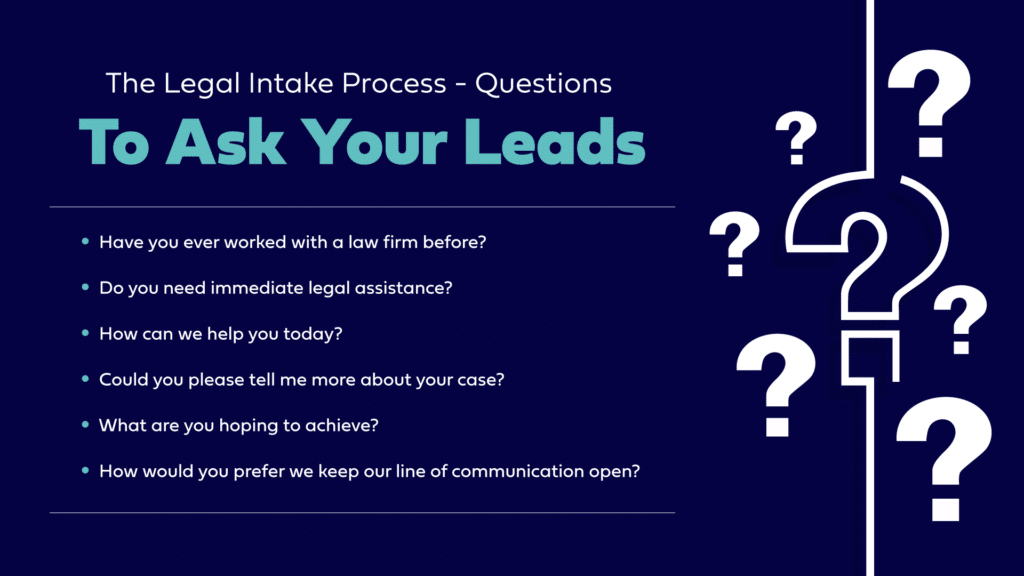
The legal intake process is arguably one of the most important processes within your law firm. Don’t leave your leads (and business opportunities) on the back burner, discover the most effective legal intake process here.
When a lead gets in touch with your firm, that is a huge opportunity however research shows that almost half (42%) of firms take 3+ days to respond to leads!
We get it, law firms are busy with the practice of law. Lawyers and legal professionals alike have extremely busy schedules and oftentimes, the leads end up taking second priority. The good news is….there’s a solution to all of this and that is optimizing your legal intake process.
The legal intake is the process of converting the leads to clients and cases. Why is it so important? That’s easy:
- A solid intake process = more clients!
- A weak intake process = missed opportunities!
A weak intake process in a law firm could translate to having whichever staff member is available to answer the phone and provide responses that may (or may not) reflect your firm. Vice versa, a solid intake process means anyone from your staff (or the designated legal intake team) is 100% confident in your firm’s messaging and knows how to translate this to leads.
To help your firm eliminate any inconsistencies and create a solid, and uniform first impression let’s dive into the process itself. Stay with us and find out more.
The Best Tactics for Your Legal Intake Process
Follow these steps and before you know it, you’ll be signing more of the cases you’ve been looking for.
1. Uniform Your Staff
Every firm’s intake process will vary, perhaps one firm has a dedicated team for intake while others may rely on whoever is not busy. Whatever the case may be, you can uniform your staff with this protocol:
2. Develop a Solid Qualification Plan
Every firm and every case is unique like a fingerprint but you’ll know when there’s a good chance the lead will convert into a case.
Here are some tips that’ll help you figure it out:
- Create a questionnaire to determine whether the lead is actively looking for legal assistance and if they can pay.
- Define what steps follow rejecting and accepting leads.
3. Build Rapport
One way to build trust from the start is to be approachable and genuine. Don’t be afraid to deviate from your list of questions and ask probing questions. This way you’ll not only collect extra information on their case but it’ll show you’re actively listening (more on this next).
4. Practice Active Listening
When a lead calls regarding legal services, chances are they’ll want to touch on their story/case and can easily become a one-sided conversation. If that is the case, don’t worry, you will get your time to go through your pointers. In the meantime, focus on what the lead is saying and perhaps some of your answers will be there.
Master the Art of Client Communication Style
5. Ask The Right Questions
No matter what questions you ask, in your legal intake you need to nail down 2 things:
- Determine the likelihood of lead converting to case
- Develop a clear image of the legal issue at hand
Before the questions, ensure you have the lead’s name, contact information (email, phone number) and preferred method of communication. With that you can begin asking these questions:
6. Discuss Fees
Discuss your payment process and accepted methods of payment. After you explain your fees, ask if they have any questions. This will be the key to setting expectations from the beginning.
7. Discuss the Best Methods to Communicate
One of the perks of investing in legal marketing is the options you have when communicating with a user. Ask the client what their preferred method of communication is and keep this for future reference.
If by any chance you can’t share information via their preferred method of communication because of legal cybersecurity or other reasons; then specify how you’ll be reaching out.
8. Respond, Respond, Respond
Time is money, quite literally for leads and firms. Research shows that if a lead doesn’t receive a call back after just 5 minutes of submitting a contact form, the conversion rate drops by 72%, take a look:
Tip: Attorneys have hectic schedules, and often, more pressing things arise. Task a staff person with lead follow-up and appointment setting. Also, consider having a dedicated person who returns all voicemails on the same day. If you need inspiration, dive into the LAWsome episode where we cover ‘The Power of Good Customer Service for Legal Professionals’.
9. Monitor Your Intake Process
Acquiring leads is the first battle, monitoring and honing in on your legal intake process is the second. You’ll want to compile and analyze your data in order to gauge the intake process.
You can begin analyzing your intake process with the following metrics:
- Number of new cases opened
- Time to respond
- Call-to-case ratio
- Cost per case
Tip: Some platforms can give you complete visibility and control of your digital investment. We recommend investing in a legal dashboard like LawEval, already designed with law firms in mind.
Don’t Give Up Easily!
Ultimately, this is our last tip: don’t give up easily.
Taking the time to optimize and build your perfect legal intake process can help your firm and clients go a long way.
If you’d like to have a team working along your firm’s side honing in on your sales process we’re here to help.
Improve Your Intake Process While Tracking Leads
The intake process at a law firm can make or break a firm’s ability to sign a case. Often, problems with intake aren’t for lack of caring — it’s more a matter of unrefined processes. There is an old adage in business management that states, “That which cannot be measured, cannot be managed.” Developing sound and repeatable processes helps manage the firm’s activities to improve profitability.
A law firm can lose cases through poor intake. Additionally, the quicker you respond to a lead, the better. Generally, responding to a lead within 5 minutes can increase the probability of getting a case. According to LeadResponseManagement.org, a provider of lead response management tools and services, the odds of a firm signing a case after:
- Calling to qualify a lead decreases by more than 6 times after the first hour of the initial call.
- Qualifying a lead if called in 30 minutes versus 5 minutes drops 21 times.
They go on to state that after 20 hours, every additional lead you call back actually hurts your ability to sign a case.
Have a dedicated team to:
- Take calls.
- Conduct initial screenings.
- Set up meetings.
You can improve intake for your team and achieve better results by:
- Defining your intake process.
- Creating intake documents to send to the client for completion.
- Linking electronic intake forms to trigger intake procedures.
Do You Have to Use Technology for Client Intake?
Let’s take a step back here. Before we even get to the call with a potential client, you need to have a specific procedure for how to handle intake. You don’t have to use technology for intake, but it makes the process smoother. Using technology:
- Ensures data integrity and standards.
- Eliminates manual errors.
- Helps an office go paperless.
- Streamlines the process.
- Gathers data for analysis and reporting.
- Makes billing easier.
- Improves the firm’s efficiency.
What Client Intake Options Are There?
There are several companies that provide intake services for law firms. Choose the best one for your firm. Each company provides different options that may be better for your firm. For example, some offer:
- English- and Spanish-speaking operators
- The option to answer throughout the day or at certain times, such as after hours and on weekends
- Working from anywhere as long as you have a cellphone
- An automated client intake that integrates with a customer relationship management (CRM) system to track leads and drafted intake documents
Some of the companies our law firm clients have worked with include:
- Alert Communications
- Captorra
- Call Ruby
- Lexicata
Tracking Leads
To understand how effectively your marketing dollars are being spent, it’s critical to track leads and their sources. When tracking leads, the first thing that needs to happen is to qualify each one that comes in. This is where your support staff is critical.
Screening Leads through Intake Protocol
AttorneyAtWork.com advises intake specialists at law firms to take each call with the attitude that you are not in the legal business — you are in the healing and relationship business. To avoid getting jaded, specify a protocol for how each call should be handled, with a script, if you feel that’s necessary. Some of the steps to incorporate in your protocol may include:
- Build rapport. Ask basic questions about the client and their legal matter before you schedule an intake appointment. Give an explanation of your firm to manage and address the client’s expectations.
- Find out if there are conflicts. Ask if they’ve worked with an attorney and why the client is seeking help. Determine if it’s something you are capable of or interested in handling.
- Gather contact data. Get each lead’s address, phone number, email addresses, social media accounts, and their client communication preferences.
- Communicate how billing works. Discuss your engagement and fee arrangements with the client. Give the client a copy of these agreements and any other relevant information.
- Tell them about the intake process. Inform them that there are various forms they will complete during the intake process.
- Talk about communication. Give a general explanation of the attorney-client relationship.
Most importantly, keep your intake process dynamic. Allow for client questions and be flexible enough to tailor your approach to the client’s level of sophistication and needs. Refresh your staff on the protocols involved in the intake process on a regular basis.
Creating Electronic Intake Forms
Next, gather useful information such as contact and billing information through an electronic form. You can do this through a customized web-based form for your clients to access through your law firm’s website. Get as much information as possible to allow you to represent the client, but do not overwhelm the client, since most clients find a visit to a lawyer’s office uncomfortable. Things to include on the intake form are:
- Phone number
- Email address
- Preferred form of communication
- Birth month and date
- Billing information
Linking the Intake Form to Trigger the Intake Procedures
Your intake documents should be connected so that data may be transferred from the form to the intake documents and into your client management and accounting systems. You can do this through Excel or Google Spreadsheets. If you’re using an automated system, have the company you’re using set it up.
Track and Share Lead Progress
Although it may seem like extra work, if you have a marketing consultant, tell them what is happening with your firm’s leads. Giving them the ability to track leads will improve the leads you get. Consultants are able to identify which pages on the site and which practice areas are generating leads. Being able to analyze the path your firm’s leads took to become clients has a great impact on your consultant’s ability to improve other pages and processes on your site. Through regular improvements based on the data you share, your firm’s website and campaign can be even more successful.







